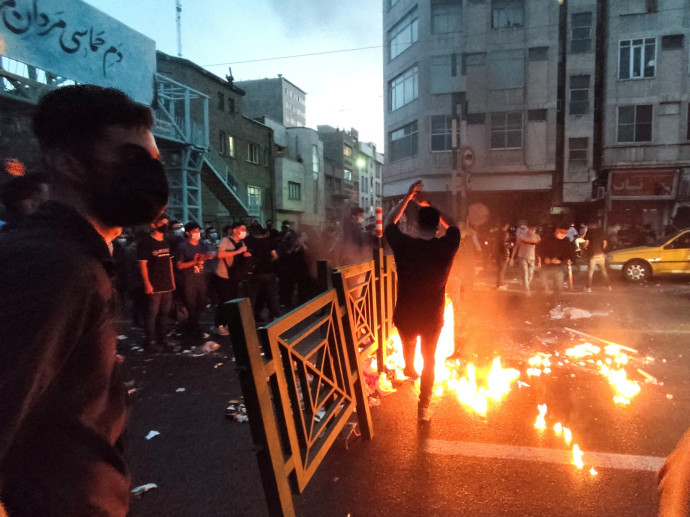Iran appears to be upping rhetoric against foreign media that it accuses of backing protests. The Iranian regime has faced protests now for more than a month and a half.
As Tehran considers that the protests will continue, it wants to find a way to shut off support that doesn’t involve a violent crackdown. This is because, although the regime has killed numerous protesters, it is trying to “manage” the protests, without the massacre of thousands.
Now the regime wants the foreign reporting to stop and it wants any media that is either in Persian abroad that backs the demonstrators, or dissident media, to feel they have been warned.
Towards that end, Iran’s pro-regime Tansim media, which is close to the IRGC, put out warnings against Iran International and Saudi Arabia. This isn’t the first time the regime has done this. It has accused Iran International, a critical media outlet, of being “terrorist media” and it has threatened Saudi Arabia numerous times since the protests began in late September.
According to the Tasnim report “Iran sent the message because Iran knows the satellite news channel, Iran International, is funded by Saudi Arabia.”

Iran hinting that “possible incidents” may happen to Saudi Arabia
The report goes on to say that “the Saudis said in response that they have nothing to with Iran International and they disavowed this terrorist media. But we fully know the Saudi connection to Iran International. And we know that Saudi Arabia is the funding source for the anti-Iran measures and that this quasi-media is funded by Saudi Arabia.”
Iran’s regime though is now hinting that “possible incidents” may happen to Saudi Arabia. This comes days after a video was released that showed a threatened attack by Iranian Shahed 136 kamikaze drones on the Shaybah energy complex in Saudi Arabia.
Back in August 2019 a similar attack by older types of Iranian drones targeted this site, it came a month before Iran also targeted Iran’s Abqaiq energy facility.
These were important attacks on Saudi Arabia by Iran and they were designed to show Iran can threaten Saudi oil exports. This comes now as tensions rise between Russia and the West and energy prices are shooting up; therefore, Iran’s threats may be taken more seriously today.
However, Iran’s threats today appear more like a mafia-style threat of “it would be a shame if something happened,” basically hinting that an “incident” may happen and Iran can’t control what might come next. Iran accuses Iran International, BBC Persian and Voice of America of stirring up the protests in Iran.
The IRGC will likely be behind any attacks that come in the next weeks. IRGC head Major General Hossein Salami said that Iran has warned the Saudi government that media backed by the Kingdom is trying to “provoke our youth with propaganda… Be careful of your behavior and control these media, otherwise, the smoke will be in your eyes. We will finish with you. You entered our internal affairs through these media, but know that you are vulnerable. We told you to be careful.”
Stirring up opposition to Saudi Arabia
Iran has hinted that it could try to empower “enemies” of Saudi Arabia in the region. Of interest here, Iran said that it might try to create controversies between Saudi Arabia and “Egypt, Iraq, Qatar, Oman and even the UAE.” Iran also hinted that Kuwait could be encouraged to turn on Riyadh.
Iran wants to exploit perceptions that Saudi Arabia is growing closer with Israel as a way to spread propaganda against Riyadh.
The report at Tasnim hints at disrupting oil exports from Saudi Arabia; encouraging the Houthis in Yemen to carry out new attacks, or other methods. Iran has also said that it has spoken with Iraqi officials to pass messages to the Saudis, to try to get anti-Iran media coverage to stop. Iraq has brokered Saudi-Iran talks over the last year.
Saudi Arabia is already under pressure because of tensions with the US administration. These tensions are ostensibly due to oil prices, but there is more to this.
Anti-Saudi media and commentators, including human rights groups and others, have been slamming the kingdom over a variety of issues. Some of this relates to trying to disrupt US-Saudi relations or harm Saudi’s ties with other western countries, or portray Riyadh as pro-Moscow.
Iran seems to be hinting that not only could it empower attacks on Saudi Arabia but that it will consider stirring up anti-Saudi voices, whether via Qatar or through other methods.
Clearly, Iran’s regime is worried or it wouldn’t be trying to suppress foreign media coverage. The regime shows how much it cares about reports abroad and it is now messaging that the regime will begin to retaliate.
